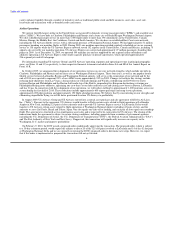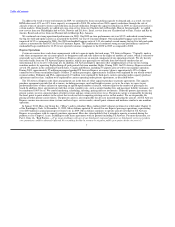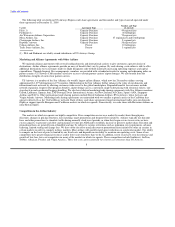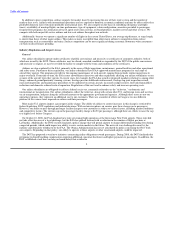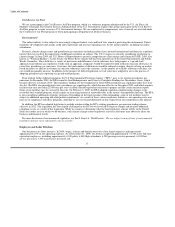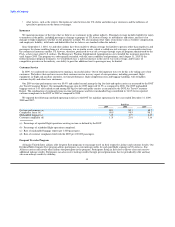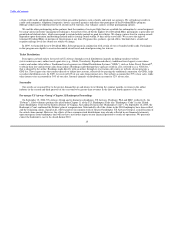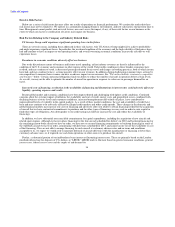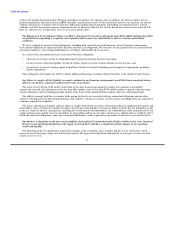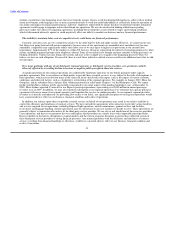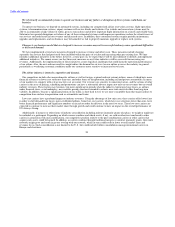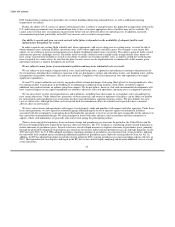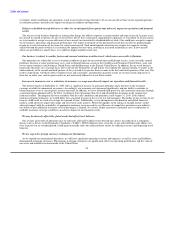US Airways 2009 Annual Report Download - page 18
Download and view the complete annual report
Please find page 18 of the 2009 US Airways annual report below. You can navigate through the pages in the report by either clicking on the pages listed below, or by using the keyword search tool below to find specific information within the annual report.
Table of Contents
Item 1A. Risk Factors
Below are a series of risk factors that may affect our results of operations or financial performance. We caution the reader that these
risk factors may not be exhaustive. We operate in a continually changing business environment, and new risk factors emerge from time to
time. Management cannot predict such new risk factors, nor can it assess the impact, if any, of these risk factors on our business or the
extent to which any factor or combination of factors may impact our business.
Risk Factors Relating to the Company and Industry Related Risks
US Airways Group could experience significant operating losses in the future.
There are several reasons, including those addressed in these risk factors, why US Airways Group might fail to achieve profitability
and might experience significant losses. In particular, the weakened condition of the economy and the high volatility of fuel prices have
had and continue to have an impact on our operating results, and overall worsening economic conditions increase the risk that we will
experience losses.
Downturns in economic conditions adversely affect our business.
Due to the discretionary nature of business and leisure travel spending, airline industry revenues are heavily influenced by the
condition of the U.S. economy and economies in other regions of the world. Unfavorable conditions in these broader economies have
resulted, and may continue to result, in decreased passenger demand for air travel and changes in booking practices, both of which in turn
have had, and may continue to have, a strong negative effect on our revenues. In addition, during challenging economic times, actions by
our competitors to increase their revenues can have an adverse impact on our revenues. See "The airline industry is intensely competitive
and dynamic" below. Certain contractual obligations limit our ability to reduce the number of aircraft in operation below certain levels.
As a result, we may not be able to optimize the number of aircraft in operation in response to a decrease in passenger demand for air
travel.
Increased costs of financing, a reduction in the availability of financing and fluctuations in interest rates could adversely affect our
liquidity, operating expenses and results.
Recent global market and economic conditions have been unprecedented and challenging with tighter credit conditions. Continued
concerns about the systemic impact of inflation, the availability and cost of credit, energy costs and geopolitical issues, combined with
declining business activity levels and consumer confidence, increased unemployment and volatile oil prices, have contributed to
unprecedented levels of volatility in the capital markets. As a result of these market conditions, the cost and availability of credit have
been and may continue to be adversely affected by illiquid credit markets and wider credit spreads. These changes in the domestic and
global financial markets may increase our costs of financing and adversely affect our ability to obtain financing needed for the acquisition
of aircraft that we have contractual commitments to purchase and for other types of financings we may seek in order to raise capital or
fund other types of obligations. Any downgrades to our credit rating may likewise increase the cost and reduce the availability of
financings.
In addition, we have substantial non-cancelable commitments for capital expenditures, including the acquisition of new aircraft and
related spare engines. Although we have in place financing for the four aircraft scheduled for delivery in 2010 and backstop financing for
the remaining narrow body aircraft we have on order, we have not yet secured financing commitments or backstop financing for some of
the widebody aircraft we have on order, commencing with deliveries scheduled for 2013, and cannot assure you of the availability or cost
of that financing. If we are not able to arrange financing for such aircraft at customary advance rates and on terms and conditions
acceptable to us, we expect we would seek to negotiate deferrals of aircraft deliveries with the manufacturer or financing at lower than
customary advance rates, or, if required, use cash from operations or other sources to purchase the aircraft.
Further, a substantial portion of our indebtedness bears interest at fluctuating interest rates. These are primarily based on the London
interbank offered rate for deposits of U.S. dollars, or "LIBOR." LIBOR tends to fluctuate based on general economic conditions, general
interest rates, federal reserve rates and the supply of and demand for
16


